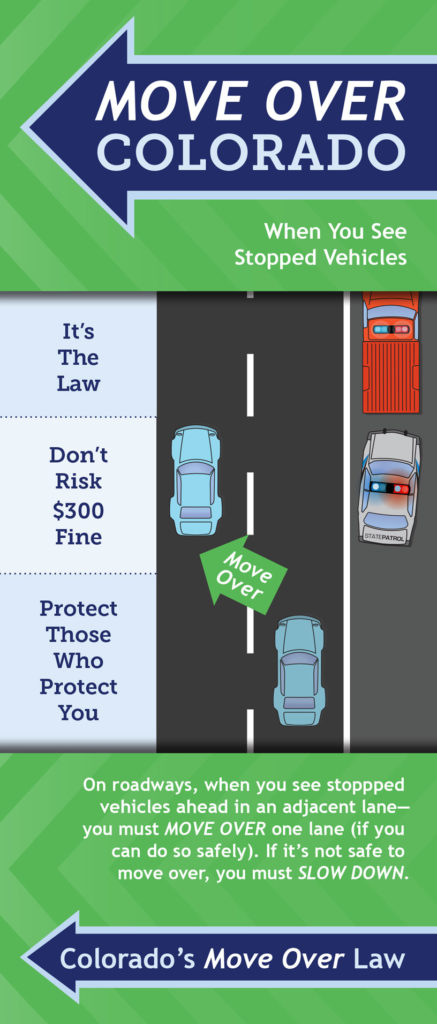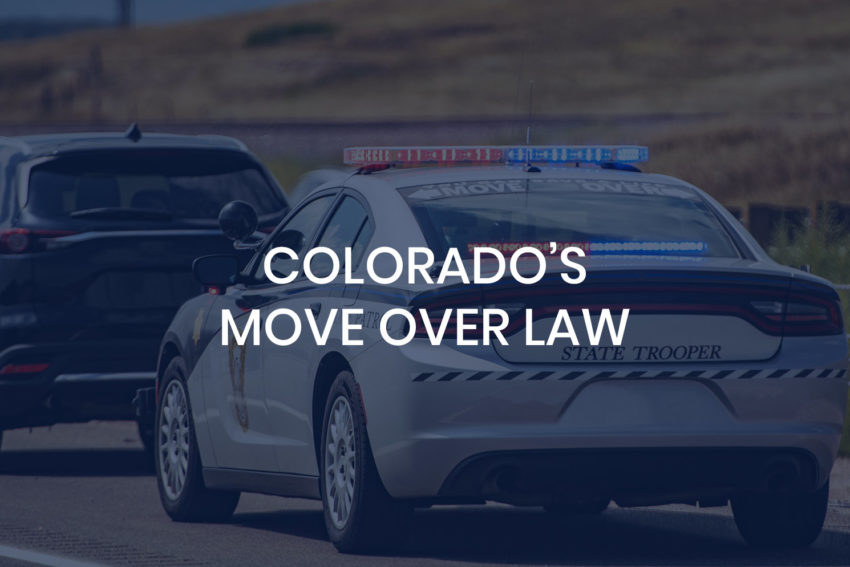Every state in the U.S. has a Move Over Law that requires drivers to change lanes and/or slow down when approaching stopped emergency vehicles. These laws were created to protect law enforcement officers, firefighters, emergency medical personnel, road crews, and tow operators who conduct critical and often life-saving operations on the side of the road by providing a wider area between them and dangerous highway traffic. Failure to obey Colorado’s Move Over Law has legal consequences, including traffic tickets, fines, and points assessed to a driver’s license. Drivers can face severe consequences if failure to obey the Move Over Law results in a serious bodily injury or death, including hefty fines and prison time.
Move Over Law in Colorado
Colorado’s Move Over Law (Colorado Revised Statute Section 42-4-705) requires all drivers to move at least one lane over when passing or approaching an authorized emergency vehicle that is stopped at, near, or in a roadway with its lights flashing. Authorized emergency vehicles include police and law enforcement, fire trucks, ambulances, tow trucks, and maintenance vehicles.
In instances where it is not safe to move over at least one lane from the stationary vehicle or a lane is not available, motorists are required by law to slow down to a safe speed.
In 2020 Colorado modified its Move Over law to define what “slow down” means. The updated law states:
- On roadways with a speed limit below 45 MPH, a driver must slow down to at least 25 MPH.
- On roadways with speed limits of 45 MPH or more, motorists must slow down to 20 MPH less than the posted speed limit.

Move Over for First Responders
The modification of Colorado’s Move Over Law was a result of the “Move Over for Cody Act,” named for Colorado State Patrol Trooper Cody Donahue who was killed in 2016 after being struck by a car during a traffic stop.
According to CDOT, traffic-related incidents are the leading cause of death for on-duty law enforcement officers, fire, EMS, maintenance workers, and tow/recovery professionals. The Colorado Department of Transportation reported that as of Oct. 18, 2021, 51 first responders across the nation had lost their lives while working on roadways, already exceeding 2020’s death toll with two months 2021 remaining.
The COVID-19 pandemic has led to an unprecedented surge in car crash deaths. In October 2021, the federal government reported road fatalities spiked in the first half of 2021, the largest increase ever recorded in its reporting system’s history during a six-month period. Colorado is also on track for the highest motorist fatality number in more than a decade.
Colorado, let’s do our part: when you see a responder or a vehicle on the side of the road, slow down, move over and give them space to work.
What are the Fines and Penalties for Failing to Obey Colorado’s Move Over Law?
Breaking Colorado’s Move Over Law is considered a Class 2 misdemeanor traffic infraction. Those who fail to slow down or move over commit the crime of careless driving, which can result in up to 90 days in jail and a fine of up to $300. This offense may also result in DMV points added to the driver’s license.
The penalty increases to a Class 1 misdemeanor if the driver causes a bodily injury to another person by failing to move over or slow down. Class 1 misdemeanor offenses are the most serious class of misdemeanors in Colorado, punishable by a 6 to 18-month jail sentence and/or fines from $500 to $5,000.
If failing to move over causes an accident that results in death, the offense increases to a Class 6 felony. The penalty for a Class 6 felony ranges from one year to 18 months in prison, and $1,000 to $100,000 in fines.
Colorado’s Move Over and Fault-Based Insurance Laws
Colorado follows a fault-based insurance law. This law defines who is financially responsible for any losses (“damages”) that resulted from a car accident. Under Colorado’s fault-based insurance law, the person who was at fault for causing the car wreck is liable for everyone else’s damages. Damages can include medical bills, lost income, property damage, and pain and suffering.
We Provide Complimentary Consultations
If you need assistance with a motor vehicle accident case involving a failure to obey the Move Over Law or a case against a careless driver, consult one of our Denver car crash lawyers. An attorney can help you recover full financial compensation for any losses that resulted from an auto accident.
